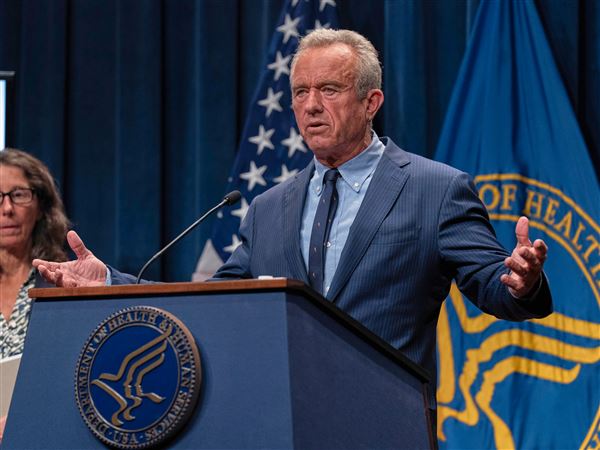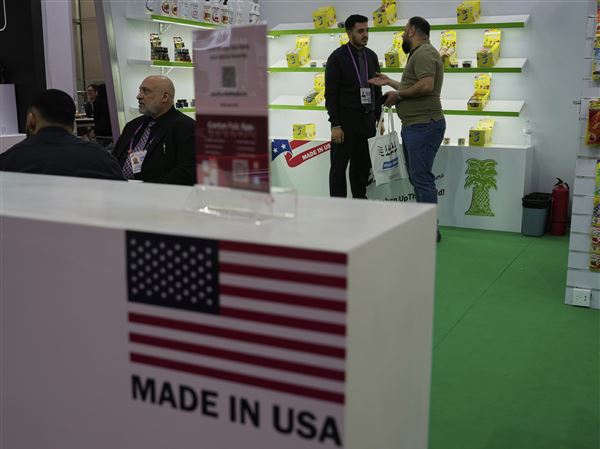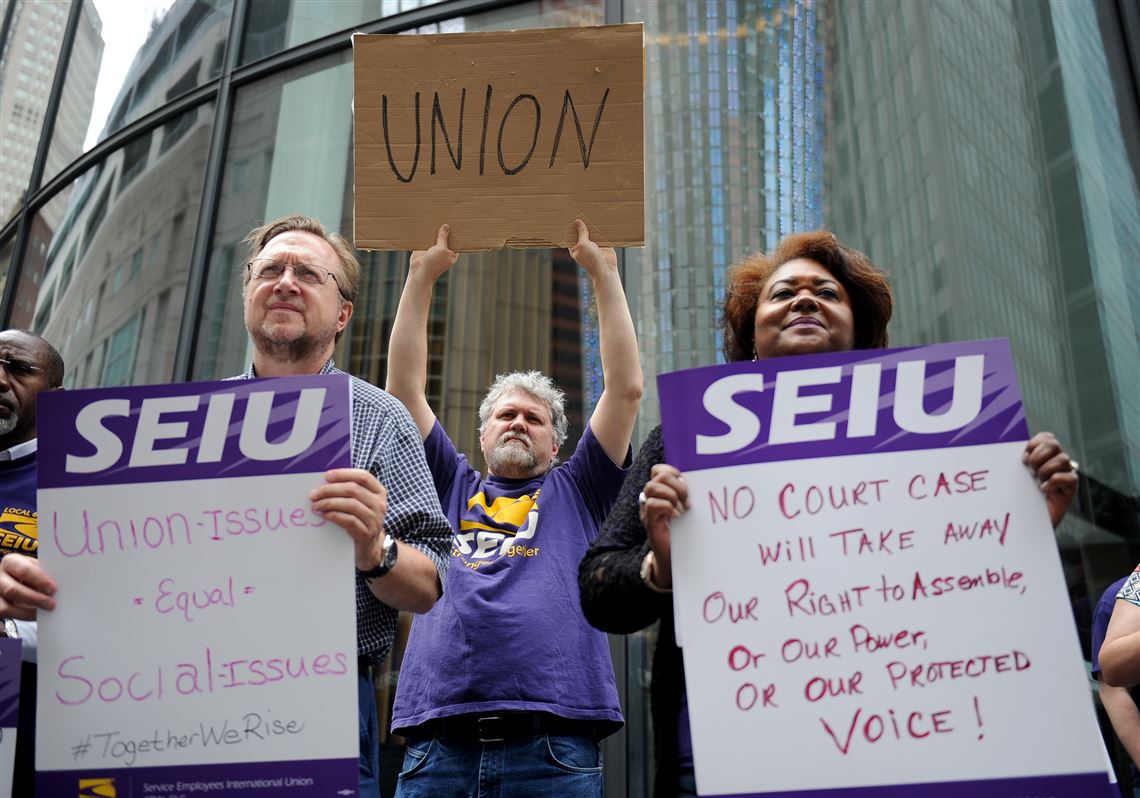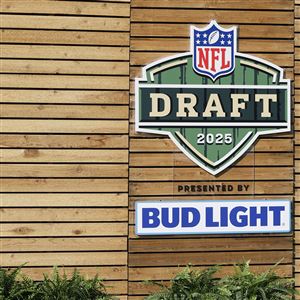The U.S. Supreme Court ruled on Wednesday that labor unions cannot require public sector workers to pay fees, breaking 40 years of precedent and dealing a major blow to unions representing millions of teachers, emergency officials and other government employees nationwide.
The high court’s historic 5-4 decision found that union fees are a form of political speech by workers that cannot be compelled by unions. The justices overturned a unanimous 1977 Supreme Court opinion that public employee unions could collect so-called fair-share fees from non-members to cover the costs of bargaining labor contracts and enforcing its provisions.
“We recognize the importance of following precedent unless there are strong reasons for not doing so,” stated the majority opinion, read by Justice Samuel A. Alito and joined by four other conservative judges. “But there are very strong reasons in this case. Fundamental free speech rights are at stake.”
The court ruled in favor of Mark Janus, an employee of the Illinois Department of Healthcare and Family Services, who argued the fees — about 78 percent of his full union dues — violated his First Amendment free speech rights. The justices rejected arguments by his union, the American Federation of State, County and Municipal Employees, as well as unions in 25 other states, that dues are not political speech.
The more liberal wing of the court formed the dissent: Justice Sonia Sotomayor, Justice Elena Kagan, Justice Ruth Bader Ginsburg and Justice Stephen Breyer.
In a dissenting opinion, Justice Kagan wrote that the conservative majority used the First Amendment as “a sword” to undercut Americans’ right to pursue better working conditions and sets a dangerous precedent for the court to reach in countless other areas of American life.
“Speech is everywhere — a part of every human activity (employment, health care, securities trading, you name it),” Justice Kagan wrote. “The majority overthrows a decision entrenched in this nation’s law — and in its economic life — for over 40 years. And it does so by weaponizing the First Amendment, in a way that unleashes judges, now and in the future, to intervene in economic and regulatory policy.”
Observers on both sides had widely expected Wednesday’s outcome after the court had deadlocked 4-4 in 2016 on a similar case filed by teachers in California. Following that decision, President Donald J. Trump nominated Justice Neil Gorsuch, who is fulfilling expectations that he would vote along conservative lines on labor cases.
Mr. Gorsuch effectively cast the deciding vote in Janus case on Wednesday.
The potential loss of fair-share fees, which cannot be used for lobbying and political expenses, could significantly sap unions of revenue at a moment when membership has fallen to historic lows. By law, unions are required to bargain on behalf of all represented workers, even those who don’t pay dues.
Wednesday’s ruling is particularly troubling for organized labor because public sector unions have been a bastion of support. About 34 percent of U.S. public sector workers — about 7.2 million people — were members of a union in 2017, compared with less than 7 percent of workers in the private sector, according to the U.S. Bureau of Labor Statistics.
Nationally, employeess in education make up more than half of all state and local government workers. Millions more state and local workers work in police and fire departments, hospitals, public transportation, waste management, museums and libraries.
Reflecting the same divisions that split the court, a wide array of labor organizations, business groups and politicians weighed in on Wednesday’s ruling.
Labor groups condemned the ruling as a politically charged attack on organized labor funded by conservative foundations. But unions also pledged to remain a united front and keep membership numbers high.
“If the goal of the people who funded this lawsuit is to silence us, I can tell you that it’s not going to happen,” said Dolores McCracken, president of the Pennsylvania State Education Association, which has about 181,000 members statewide. Of those, about 7,000 pay fair-share fees, the association has said.
The union will “change some of our operations,” Ms. McCracken said but remains confident that workers “will continue to see the value in belonging to our association.”
Pittsburgh Mayor Bill Peduto said the ruling “only strengthens our resolve to come together and protect the middle class jobs our city and country are built upon.”
Business groups cheered the ruling as a long-overdue victory for free speech in the workplace.
“Pennsylvania’s public sector workers should also have the right to refrain from financially supporting the organization if they disagree with union leaders’ political preferences, strategies or positions on issues,” said Gene Barr, president and chief executive officer of the Pennsylvania Chamber of Business and Industry.
“This ruling does not detract from a union’s ability to seek membership — they will simply be required to recruit and retain members just like the Pa. chamber and every other membership association engaged in lobbying or politics here in Harrisburg,” he added.
One outcome of the ruling could be more frequent strikes to solve labor disputes that otherwise could have been solved at the bargaining table, said Heidi Shierholz, director of policy for the Economic Policy Institute, a left-leaning think tank in Washington, D.C.
“It is likely that today’s decision will lead to greater instability in state and local workforces,” she said, pointing to the teacher strikes in West Virginia and Oklahoma earlier this year that closed schools and, ultimately, resulted in pay raises.
Other experts predicted that while unions might become smaller, they could be stronger.
With each member’s money no longer a given, unions will be motivated to improve communication and hear concerns. Unions have been contending with right-to-work laws, which have passed in the majority of state legislatures, that allow union members across all sectors to stop paying dues.
If Gov. Tom Wolf loses the gubernatorial election this year, Republicans have vowed to pass a right-to-work law in Pennsylvania.
A study released earlier this month by two university professors found teachers unions adjusted fairly well to right-to-work laws in Wisconsin and Michigan.
“We have found evidence that teachers unions are growing accustomed to challenges and learning to adapt in response,” wrote the professors, Bradley D. Marianno, an assistant professor of educational policy and leadership at the University of Nevada, Las Vegas, and Katharine O. Strunk, a professor of education policy at Michigan State University.
“It is possible — and we argue even likely — that the Janus ruling will cause union leadership to listen to their members in new ways,” the professors wrote. “They will need to fight for every member, to convince them their services are worth paying for.”
On Wednesday, Pennsyvlania Senate Democrats, including Sen. Jay Costa, D-Forest Hills, annnounced plans for a bill to make union elections easier and to require new employees in a workplace be introduced to unions.
Daniel Moore: dmoore@post-gazette.com, 412-263-2743 and Twitter @PGdanielmoore
First Published: June 27, 2018, 2:14 p.m.
















